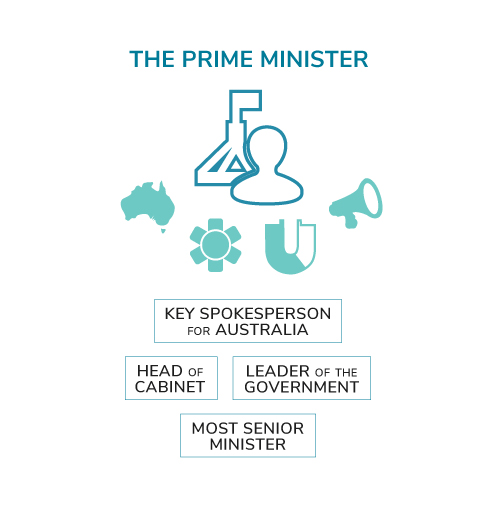Does the Prime Minister have the last say?
Role of the Prime Minister in Australia

Parliamentary Education Office (peo.gov.au)
Description
The Prime Minister is:
- the most senior minister in the Australian Government
- the key spokesperson for Australia
- the head of Cabinet
- the leader of the government.
This work is licensed under a Creative Commons Attribution-NonCommercial-NoDerivs 3.0 Unported License.
You are free to share – to copy, distribute and transmit the work.
Attribution – you must attribute the work in the manner specified by the author or licensor (but not in any way that suggests that they endorse you or your use of the work).
Non-commercial – you may not use this work for commercial purposes.
No derivative works – you may not alter, transform, or build upon this work.
Waiver – any of the above conditions can be waived if you get permission from the copyright holder.
Thanks for your question, Sylvia.
Although the Prime Minister has a very important and high-profile position, they only sometimes have the last say.
As the leader of the Australian Government, the Prime Minister will have the last say in:
- selecting members of the government to be ministers
- leading Cabinet meetings and deciding government policy
- advising the Governor-General about important issues such as the appointment of ambassadors and heads of government departments
- deciding when to ask the Governor-General to call a federal election.
The Prime Minister is the leader of their party, but they are also part of a team and work with their party on government plans and policy. The Prime Minister is chosen as leader by a vote of their party and if the Prime Minister did not listen to party members, they risk losing the support of their party and could be replaced.
Although the Prime Minster is a member of the House of Representatives, meetings of the House are run by the Speaker. The Prime Minister has the same rights as other members of parliament to speak and vote on issues considered by the Parliament and can only speak when called upon by the Speaker.
The Prime Minister doesn't have the final say in making laws either. The House of Representatives – where the Prime Minister has a single vote – has to agree to a bill – proposed law. The Senate – where the Prime Minister doesn’t have a vote at all – then has to agree to the bill. Finally, it is up to the Governor-General to provide Royal Assent – sign the bill into law.
